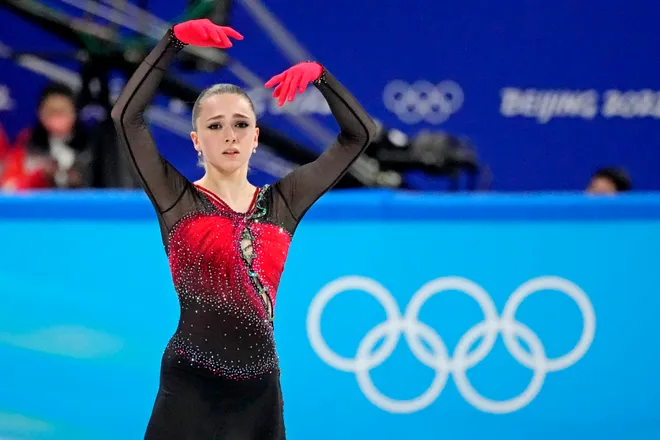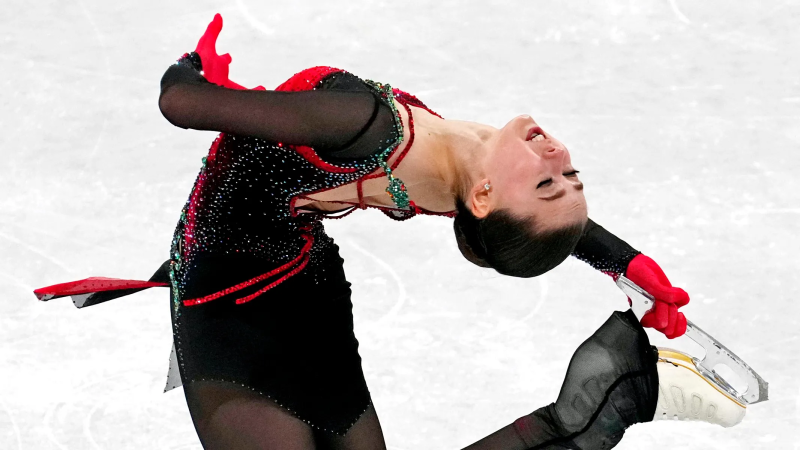Why is Russian skater's hearing over her Olympic doping shrouded in secrecy?
LAUSANNE, Switzerland — In a glass and stone convention center on a hillside overlooking Lake Geneva and the Alps, one of the most anticipated doping hearings in the history of the Olympic movement will begin Tuesday morning not with a worldwide audience but rather with no audience at all.
It is so shrouded in secrecy that for nearly two weeks, a spokeswoman repeatedly refused to divulge the simple detail of the hearing’s start time.
An infuriating blend of dithering and delays that began by robbing U.S. and Japanese figure skaters of their medal ceremony at the 2022 Beijing Winter Olympics more than a year and a half ago has finally wound its way to the city that is the cradle of Olympic sports organizations, more specifically to the doorstep of the Court of Arbitration for Sport, the Supreme Court, so to speak, of the international sports world.
This is where the fate of Russian figure skater Kamila Valieva will finally be decided, although it won’t happen quickly because absolutely nothing has happened when it should have in this excruciating case. There will be three or four days of hearings in front of a panel of three arbitrators this week, followed a month or two (or three?) later by the arbitrators’ decision.
If Valieva is found guilty, she would likely be suspended for two to four years and she and her Russian teammates would likely lose their gold medal, with the other teams moving up a spot: the U.S. to gold, Japan to silver and fourth-place Canada to bronze.
If she is found innocent, or if she receives some measure of leniency because she was 15 at the time — a minor also known as a “protected person” in the parlance of the world anti-doping movement — then the order of the medals would likely remain the same.
When and where a medal ceremony would then be held is anyone’s guess, although the idea of staging it during the opening ceremony of the 2024 Paris Summer Olympics has been floated.
But, like everything else in one of the most bizarre Olympic scandals of all time, it’s complicated. If Russia remains on top of the medal podium, there is almost no chance either the International Olympic Committee or Paris organizers would want to start their Olympics by honoring the nation that invaded Ukraine.

Irony abounds in this saga, which has been brought to us entirely by the Russians, whose state-sponsored doping schemes are the stuff of legend and have never been fully punished within the Olympic movement, meaning they will likely keep happening.
After the Valieva scandal upended the Beijing Games, the duty to conduct the investigation of Valieva’s doping violation fell to … Russia. Specifically, the Russian Anti-Doping Agency, the oxymoron to end all oxymorons, an organization that was suspended from 2015-2018 for helping Russian athletes cheat.
Needless to say, RUSADA was in no hurry to “investigate” its superstar figure skater, and might still be “investigating” were it not for public pressure, especially from the U.S. Anti-Doping Agency. What should have taken a few months ended up consuming nearly a year, with a RUSADA disciplinary tribunal eventually finding that while Valieva committed an anti-doping rule violation, she bore “no fault or negligence” for it. RUSADA apparently wanted to keep this a secret, so the World Anti-Doping Agency, clearly losing its patience, made the decision public.
That brings us to this week, where WADA and the International Skating Union, the worldwide governing body of figure skating, are going to present their case for a Valieva suspension and disqualification of her Olympic results, while Valieva and her attorneys are going to hope she, well, skates.
In another plot twist, Valieva has decided not to show up in person but rather to testify remotely, via video, which is allowed. But there were other skaters who desperately wanted to come to Lausanne for the hearing: the U.S. team, all nine members of which sent a letter to CAS last month asking to be granted a seat to observe the hearing. The Americans’ request was denied, so the hearing will go on in private, hidden from the outside world.
“The entire process, including the secrecy and the unnecessary delay, has essentially defeated justice as all the athletes have been robbed of their moment on the podium which regardless of the outcome can’t be replaced now,” USADA CEO Travis Tygart said in a text message Sunday.
“Let’s hope athletes and the public can find some satisfaction once the decision is finally rendered, but we have to recognize that is really hard given the entire hearing is completely closed and even the affected athletes have been denied access to observe the process which will materially impact their lives forever.”
The disgust on behalf of the medal-less athletes is palpable and understandable, but occasionally, there is some progress. Late Monday afternoon, the CAS spokeswoman finally revealed what time the Valieva hearing would start on Tuesday. It’s 10 a.m.

Disclaimer: The copyright of this article belongs to the original author. Reposting this article is solely for the purpose of information dissemination and does not constitute any investment advice. If there is any infringement, please contact us immediately. We will make corrections or deletions as necessary. Thank you.







